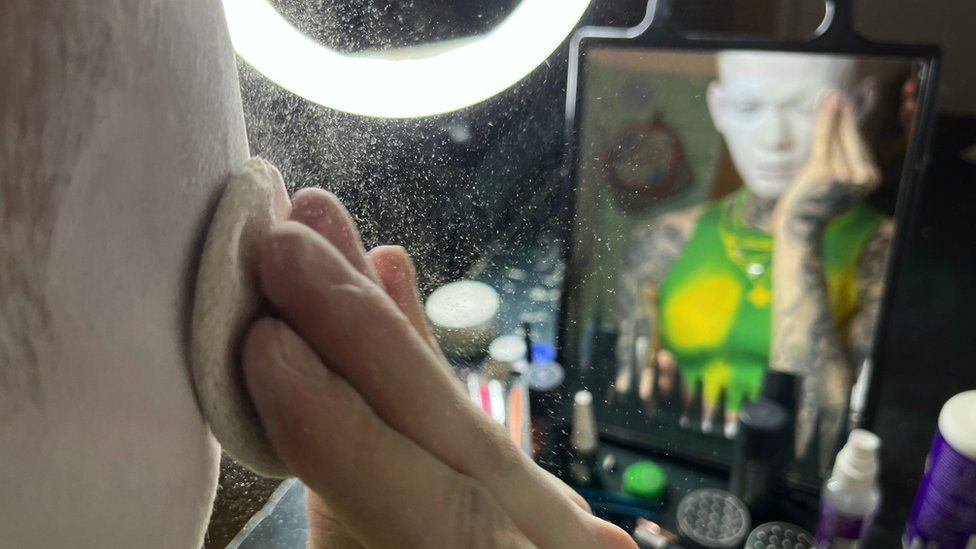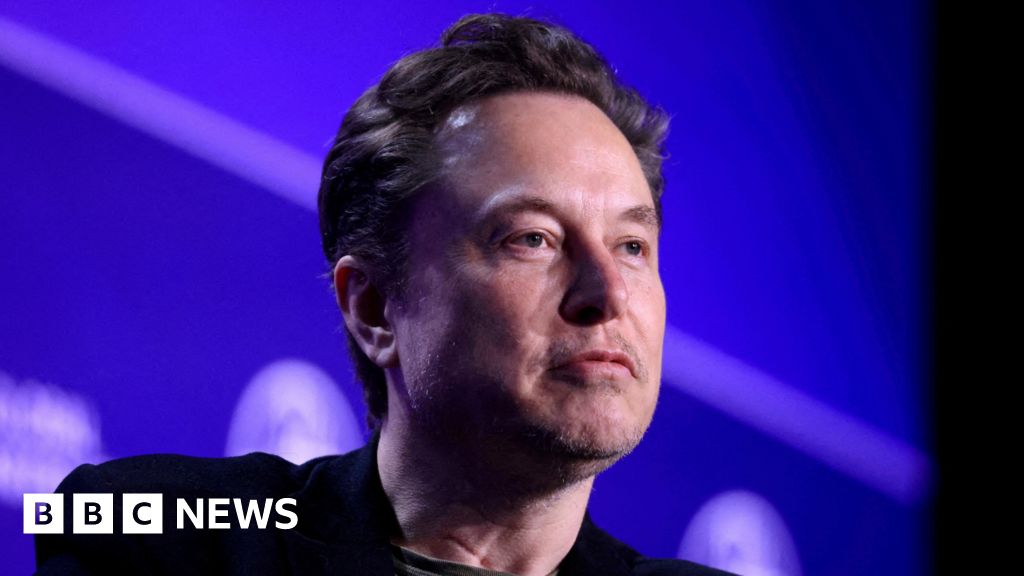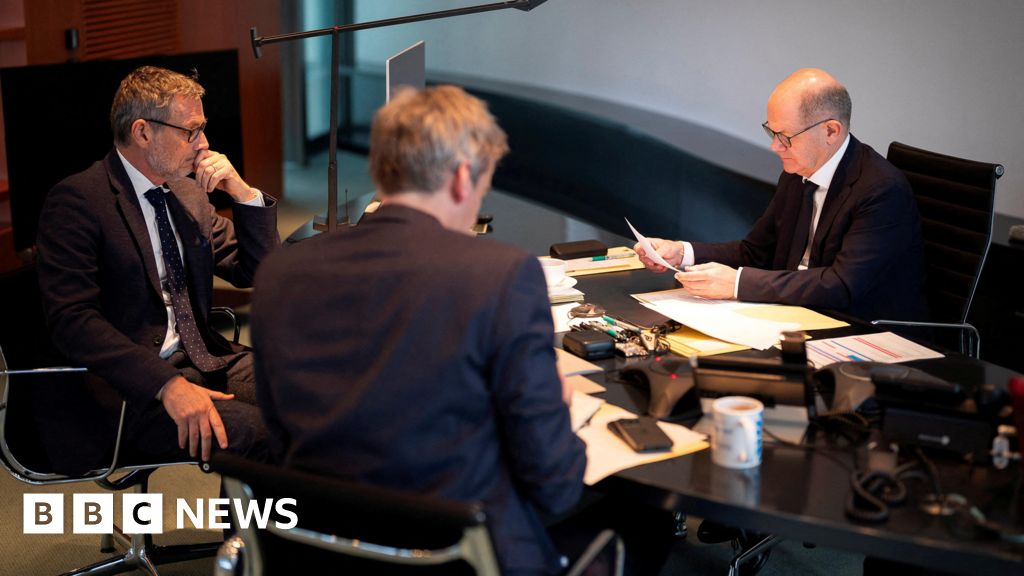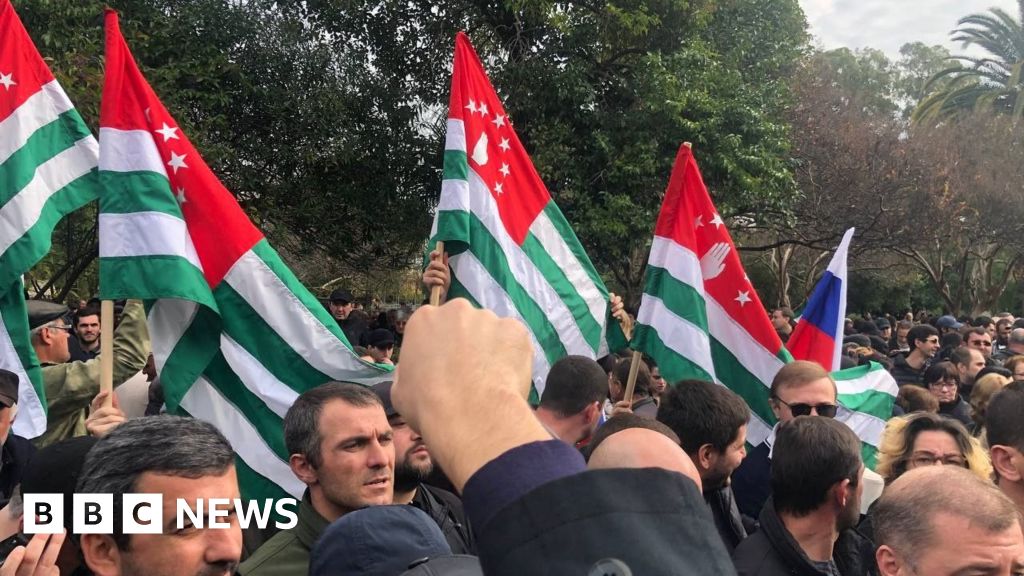ARTICLE AD BOX

Danya has made a difficult decision to leave Russia after the country passed a new law targeting LGBT people
By Will Vernon
BBC News, St Petersburg
"I'm the only monster drag queen in Russia," Danya proudly tells me as he applies ghostly-white make-up in front of a mirror. We're sitting in his kitchen, a rainbow flag adorning the wall.
Danya's act is horror-themed - think Halloween meets drag. The 22-year-old regularly performed at a queer club night in St Petersburg called Gender Blender. But the project has now cancelled its shows after a new anti-LGBT law was passed by the Russian Parliament in December. Danya's work has all but dried up.
"According to the law, it's forbidden to do what we're doing," Danya says. "We're a lot more anxious now. The risks are much higher."
The new law bans "propaganda of non-traditional sexual relations" amongst all age groups. Anyone caught committing this "offence" could be fined up to 400,000 roubles ($5,840; £4,730), with much higher fines for organisations or journalists.
Since the law was passed, Danya has decided to leave Russia and move to France. He says that living in a country where it's illegal to "just be yourself" makes him feel afraid. "My hands are tied. I just don't have a choice anymore. Either I leave the country, or stay here and wait for it to get even worse. What's happening now - it's very frightening."
Danya says his performances are loved by audiences in St Petersburg's clubs
The bill began its journey through the Russian legislative system last summer, shortly after Moscow launched its so-called special military operation.
The timing is no accident: Vladimir Putin says that Russia is not only fighting Ukraine on the battlefield, but also "Western" values. During a speech in the Kremlin to mark the illegal annexation of four Ukrainian regions, the president lashed out at the West and LGBT rights, calling them "pure Satanism".
LGBT activist Piotr Voznesensky says the link to the war in Ukraine is "obvious". In his flat in central St Petersburg, he shows me the exhibits from his short-lived LGBT museum - Russia's first. He opened the exhibition to the public in September last year but had to close it again once the new law passed.
He says the law is an attempt by the Kremlin to divert the public's attention away from setbacks on the battlefield. "The war is lost, the economy is destroyed, and the authorities need to show people what they have risked their lives for," says Piotr. "And the best idea they have is to find a new scapegoat - LGBT people."
Piotr Voznesensky's flat is full of exhibits from his now-closed LGBT museum
This is not the first law to place restrictions on Russia's queer community. Ten years ago, a bill was passed banning so-called "gay propaganda" in relation to children. Human rights groups say that it was followed by a rise in violent homophobic attacks in Russia.
Olga Baranova, from Moscow Community Centre for LGBT+ Initiatives, told me that the new law will further stigmatise LGBT people. "We will go fully underground, there will be fictitious marriages, fictitious families. The privileged ones will leave the country. Those that can't leave the country will go underground and look for partners somehow - using closed channels."
The worry now amongst the LGBT community is how, when and against whom the law will be applied. Russian legislation is notoriously vague, giving the authorities a blunt instrument that can be applied arbitrarily.
But the fear generated by the legislation is already leading to censorship: online cinemas have deleted LGBT-themed films and TV series and edited out gay scenes. In one episode of the highly-acclaimed HBO series The White Lotus, a Russian streaming service changed the word "gay" to "man", edited in a towel onto one male character's bare backside and deleted a gay sex scene, just days after the law was adopted.
The book Shattered, about the romance between two men, has been heavily redacted in Russia
Books, too, are being censored. Shops across the country have withdrawn titles with LGBT themes and characters from sale. In one St Petersburg bookshop, I find a recently-released title, Shattered - a tale of romance between two men. As the book is wrapped in plastic, I must buy it to look inside. The text has been redacted by the publisher, with whole sections replaced with black lines.
One of the co-authors of the law, an openly homophobic nationalist called Vitaly Milonov, agrees to speak to me via videolink. He is allegedly in the city of Horlivka in occupied eastern Ukraine, having travelled to the frontline as a volunteer fighter. He dismisses accusations that the law is discriminatory, saying people's private lives will be respected.
At a time when thousands are dying in Ukraine, Russia is isolated internationally and people are fleeing this country, I ask him whether it's appropriate to be focussing on an LGBT law. "Russia is not being isolated, we have a conflict with the Western world!" Mr Milonov says. "Why should you point at us that we have the wrong ideology? I think it is our sovereign right to have legislation that we like to have."
Back in Danya's flat, he shows me some of the costumes he has lovingly designed for his drag act. The audiences in the St Petersburg clubs love his alternative performance, he says. He doesn't want to leave this country.
"In what kind of a Russia can you imagine wanting to live?" I ask him. "A free Russia," he tells me, thinking about the question carefully. "One that doesn't undermine the most basic human rights that every person should have. Because I think my orientation is my right from birth, and no-one has the right to cancel, ban it, or prosecute me for it."
Produced by Liza Shuvalova

 1 year ago
19
1 year ago
19








 English (US)
English (US)